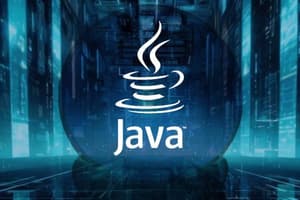Podcast
Questions and Answers
What is the primary focus of Object Oriented Programming (OOP)?
What is the primary focus of Object Oriented Programming (OOP)?
- Using objects to represent and manipulate data (correct)
- Using arrays to store and retrieve data
- Using loops to iterate through data
- Using functions to manipulate data
What are objects in Object Oriented Programming?
What are objects in Object Oriented Programming?
- Data types used to declare variables
- Instances of a class created from a class (correct)
- Functions used to manipulate data
- Templates for creating classes
What are classes in Object Oriented Programming?
What are classes in Object Oriented Programming?
- Templates for creating objects (correct)
- Variables used to store data
- Functions used to manipulate data
- Collections of objects
What is a characteristic of objects in Object Oriented Programming?
What is a characteristic of objects in Object Oriented Programming?
What is an example of an object in Object Oriented Programming?
What is an example of an object in Object Oriented Programming?
What is the purpose of a class in Object Oriented Programming?
What is the purpose of a class in Object Oriented Programming?
What is a characteristic of classes in Object Oriented Programming?
What is a characteristic of classes in Object Oriented Programming?
What is an instance variable in Object Oriented Programming?
What is an instance variable in Object Oriented Programming?
What is abstraction in the context of Java?
What is abstraction in the context of Java?
What is encapsulation in Java?
What is encapsulation in Java?
What is inheritance in Java?
What is inheritance in Java?
What is polymorphism in Java?
What is polymorphism in Java?
What is method overloading?
What is method overloading?
What is method overriding?
What is method overriding?
What is the purpose of abstraction in Java?
What is the purpose of abstraction in Java?
What can programmers create using abstraction?
What can programmers create using abstraction?
Flashcards are hidden until you start studying
Study Notes
Object-Oriented Programming (OOP)
- OOP is a programming paradigm that focuses on using objects to represent and manipulate data.
- In OOP, data is encapsulated within objects, which are defined by their properties (attributes) and behaviors (methods).
Objects
- Objects are instances of a class, created from a class in languages like Java.
- They have states and behaviors.
- Objects correspond to real-world entities, can be physical or logical, and take up space in memory.
- Examples of objects include a dog, chair, tree, etc.
Classes
- Classes are like object constructors for creating objects.
- A collection of objects is said to be a class.
- Classes are logical quantities that don't consume space in memory.
- A class is also called a template of an object.
- Classes have members, including fields, methods, and constructors.
Class Declaration
- A class declaration consists of:
- Modifiers (public or default access)
- Class name (initial letter)
- Superclass (a class can only extend one parent)
- Interfaces (a class can implement more than one interface)
- Body (surrounded by braces, { })
Java OOP Concepts
Abstraction
- Abstraction is using simple things to represent complexity.
- It allows programmers to create reusable tools by breaking down complex systems into smaller components.
Encapsulation
- Encapsulation is the practice of keeping fields within a class private.
- It provides access to those fields via public methods, creating a protective barrier that keeps data and code safe.
Inheritance
- Inheritance is a special feature of OOP in Java.
- It lets programmers create new classes that share some attributes of existing classes.
Polymorphism
- Polymorphism allows programmers to use the same word to mean different things in different contexts.
- It has two forms: method overloading and method overriding.
Studying That Suits You
Use AI to generate personalized quizzes and flashcards to suit your learning preferences.




